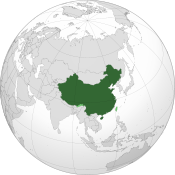China's winter weather threatens food supplies
Thursday, January 31, 2008

Image: sarcozona.
A Chinese official says harsh winter weather is threatening food production and adding to inflationary pressures. Political pressure is also building on the government for its failure to anticipate and solve the problems.
A top Chinese disaster relief official was quoted by Hong Kong's South China Morning Post newspaper Thursday as calling it the worst natural disaster since the People's Republic was founded in 1949.
Tens of millions of Chinese have been affected by the snowstorms across the central and southern parts of the country. Hundreds of thousands are camping out in train stations, hoping the snowed-in trains will start running again to take them home for the lunar new year holiday. An unknown number of people are stranded on icy highways, cut off from adequate heat and food.
The situation is so serious that Premier Wen Jiabao has personally visited train stations in Hunan and Guangdong provinces in the past couple of days. He is telling stranded workers the government is trying to get transportation moving so they can get home for the holiday. But other officials have advised migrant workers to forget about going home, and stay in their places of work.
Officials say unusually low temperatures and heavy snowfalls have destroyed crops and greenhouses, and are severely affecting winter food production. Chen Xiwen is the deputy director of the Communist Party's leading financial team.
Chen says the impact of the disaster in southern China on winter crop production is extremely serious. He says the impact on fresh vegetables and fruit has been catastrophic in some places.
Prices for fresh fruit and vegetables have doubled in some of the worst-hit areas. The situation is exacerbating the rise in food prices that began last year.
China's consumer price index rose nearly 5 percent for all of 2007, and was up 6.5 percent in December alone. A major part of the increase was in food prices.
Chen, however, says he does not expect inflation this month to get worse, despite the crop damage being caused by the snow.
Chen says winter grain and edible oils are grown mainly in the north, which is outside the storms' reach, and winter wheat production will not be seriously affected.
Two weeks of ice and snowstorms have killed more than 60 people and caused more than three billion dollars in direct damage.
China's top weather expert told state media Thursday the storms will last well into the new year holiday, which begins February 6.
The lunar new year is China's most important holiday. Normally, tens of millions of people would be heading home at this time.
Sources
- Daniel Schearf. "China's Winter Weather Threatens Food Supplies, Puts Political Pressure on Leaders" — Voice of America, January 31, 2008
- "China's big chill threatens more holiday misery" — Agence France-Presse, January 31, 2008


